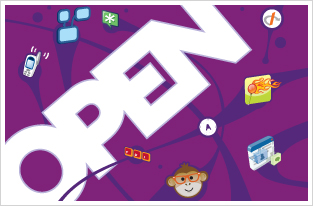
On Tuesday Yahoo! launched its Open Strategy, exposing Yahoo! account data and social connections to third-party developers. Yahoo! Open Strategy is the third pillar of faith announced by CEO Jerry Yang last year during the company’s rebirth. Y!OS is the new glue connecting the next versions of Yahoo!’s own properties and will eventually power more relevant advertising across the network. In this post I will provide an overview of the new Yahoo! services and its impact on both Yahoo! and third-party developers. Yahoo! Open Strategy is one of the keynote presentations at Widget Summit next week.
The Yahoo! Open Strategy first and foremost unites Yahoo!’s own product fiefdoms into a common set of interchangeable components. The new platform ties together social features and rich content units across Yahoo! properties in much the same way as YUI abstracts a common set of JavaScript and CSS interactions across Yahoo!. The company announced plans to integrate the Y!OS platform into a new version of My Yahoo! and Yahoo! Mail over the next year.
Yahoo!, like many portals, receives most of its user activity from mail and IM networks. These are the explicit social networks, tracking who we communicate with every day and at what frequency. Yahoo! Mail, Yahoo! Messenger, and Yahoo! Mail represent some of the largest front-doors on the Web across a very international audience. Yahoo! is building upon these established strong relationships to construct a social platform receiving new, relevant inputs every day. Y!OS is a partial answer to Yahoo!’s build vs. buy decision it faced in September 2006 when Yahoo! reportedly offered to buy Facebook for $1 billion (about $400 million at today’s share price).
A new Yahoo! Profile

The new Yahoo! profile pages collect more information on every Yahoo! user in an interface that is easy to discover and share. Yahoo! previously buried this data inside user account preferences and really didn’t provide much motivation to keep profile data up-to-date. The new Yahoo! profile is at the center of the Yahoo! Social experience, motivating participating users to better describe themselves to connected friends and services.
Exposing this profile data across Yahoo! applications ultimately leads to richer ad-mining for Yahoo! and its partners.
Social APIs
Yahoo! tracks explicit and implicit user connections through its Contacts platform and Social Directory. Messenger buddies, address book entries, and direct communications all influence the Yahoo! social platform. Yahoo! social features are similar to what publishers have come to expect inside a Facebook social graph or combined news feed but adds live user presence (online/offline) to the mix.
Yahoo! Application Platform

The Yahoo! Application Platform (YAP) adds third-party content to Yahoo! properties through a full-page editing canvas and small widgets. The Yahoo! Application Platform is build on OpenSocial 0.8 JavaScript APIs combined with Yahoo!’s own markup language similar to a server-side include and FBML.
The YAP widget view is restricted to static content for speed. Developers can’t use JavaScript, PHP, or other languages within a Yahoo! widget and are not allowed to display any advertising or promotions. These heavy restrictions strip the widget down to its essentials for the sake of speed and scalability. The no-advertising and no-promotions clause may cause companies to rethink content monetization on the Yahoo! platform.
Summary
The Yahoo! Open Strategy 1.0 release is just the beginning of Yahoo!’s rewiring. The platform really gets interesting once Yahoo! flips on My Yahoo! and Yahoo! Mail support, enabling 500 million worldwide users to access new content. Yahoo! already owns a compelling notification platform in Messenger and Mail, which should drive the virality of applications through invitations and updates that actually reach their intended recipient. Yahoo! has assembled a small team of ex-BEA middleware experts behind the scenes to drive new Java-based platform apps across the company and around the world. The Y!OS launch this week is a good start and I’m looking forward to Yahoo! delivering on its vision.
